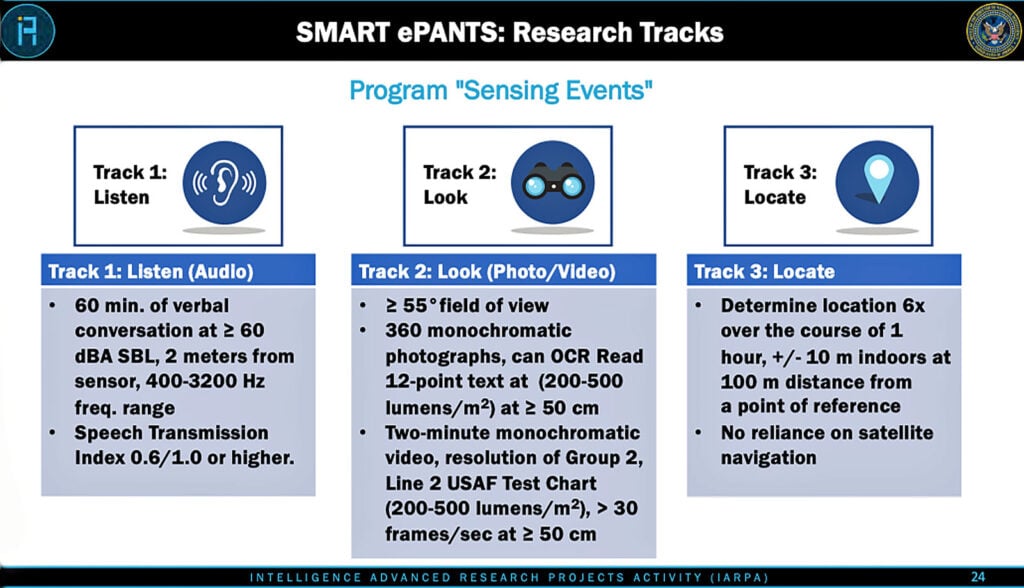 By B.N. Frank
By B.N. Frank
It’s hard to keep track of all the ways Americans are being spied on by private businesses and government entities while simultaneously being fried by their harmful electromagnetic radiation-emitting devices and infrastructure. Renewed efforts toward “smart” clothing will obviously make an already bad situation worse.
From Children’s Health Defense, The Defender:
U.S. Spy Agencies to Launch ‘Smart Clothing’ Under Guise of ‘Better Health Monitoring’
According to the Armed Forces Communications and Electronics Association, “SMART ePANTS could revolutionize the Internet of Things by collecting data to help intelligence, medical and sports commmunities.”
The U.S. Intelligence Community (IC) recently launched an effort to make computerized clothing a reality — a move critics say could result in massive biometric surveillance of citizens and an increase in people’s exposure to radiofrequency radiation.
Miss a day, miss a lot. Subscribe to The Defender’s Top News of the Day. It’s free.
The Office of the Director of National Intelligence (ODNI) on Aug. 22 announced that the IC’s advanced research and development arm, Intelligence Advanced Research Projects Activity (IARPA), would develop its computerized clothing program — Smart Electrically Powered and Networked Textile Systems, or SMART ePANTS — over the next three-and-a-half years.
The government’s SMART ePANTS program works to create clothing with “integrated audio, video, and geolocation sensor systems that feature the same stretchability, bendability, washability, and comfort of regular textiles.”
Items slated for production include shirts, pants, socks and underwear.
Credit: SMART e-PANTS presentation, page 25
IARPA, in partnership with the Naval Information Warfare Center, Pacific, awarded research contracts to develop and manufacture the computerized clothing totaling over $22 million to Nautilus Defense and Leidos, Inc., according to an Aug. 9 Pentagon announcement.
SRI International, the Massachusetts Institute of Technology and Areté received undisclosed amounts to develop the technology, according to an article in The Intercept.
Investment giants Vanguard and Black Rock — which benefited from the sale of COVID-19 vaccines and have ownership stakes in technology companies developing vaccine passports and digital wallets — are listed among Nautilus Defense’s and Leidos’ top investors.
SMART ePANTS Program Manager Dawson Cagle, Ph.D., who traced his inspiration for the program to a desire for better health-monitoring options for his diabetic father, said in the recent press release, “IARPA is proud to lead this first-of-its-kind effort for both the IC and broader scientific community which will bring much-needed innovation to the field of ASTs [Active Smart Textiles].”
RFK Jr./Hooker NEW book: Vax-Unvax. Order Now!
An article published in January in PubMed hyped the potential of electronic textiles as a “new age of wearable technology for healthcare and fitness solutions,” touting their uses in products as varied as diapers, masks and bedding, and for such applications as “monitoring health conditions, treating chronic diseases, rehabilitation, and improving health and social lifestyles.”
“SMART ePANTS could revolutionize the Internet of Things by collecting data to help intelligence, medical and sports commmunities,” wrote the Armed Forces Communications and Electronics Association.
But critics — including Ted Claypoole, legal expert and cyberspace law committee chair for the American Bar Association — said IARPA’s program raises major “obvious” privacy concerns.
Claypoole told The Defender that fabrics being developed by the IC are likely “not just for keeping our people safe, but also for finding and following smart-fabric wearers who do not know they are being followed.”
The development of smart fabrics and computer wearables is not a new effort, he said.
In their book, “Privacy in the Age of Big Data: Recognizing Threats, Defending Your Rights, and Protecting Your Family,” Claypoole and Theresa Payton traced commercial efforts to create smart clothing over the past decade, including a ski jacket with earphones in the hood and input devices on the sleeve that connect to the wearer’s phone via bluetooth.
However, the fact that these smart wearables are being designed by the IC is particularly worrisome to Claypoole:
“The technology, when used by the government, opens a new level of intrusion that raises serious Constitutional concerns. Will the government need a warrant to anonymously track people using these fabrics? It should, but that determination will need to be made by courts over time.”
‘I question whether any of this is legal’
W. Scott McCollough — Children’s Health Defense (CHD)’s chief litigator for the organization’s electromagnetic radiation (EMR) cases — shared Claypoole’s concerns.
“While the person choosing to wear the computerized clothing at least has given some kind of consent, all those around that person have no say at all,” McCullough said.
“I question whether any of this is legal,” McCollough added. “The technology will gather biometric data from those nearby, as well as capture all audio and visual data. There are states where all-party consent is required for this.”
Nicole de Haay, an IARPA spokesperson, told The Intercept that IARPA programs are “designed and executed in accordance with, and adhere to, strict civil liberties and privacy protection protocols.”
“IARPA performs civil liberties and privacy protection compliance reviews throughout our research efforts,” she added.
The IARPA did not elaborate further on how it would ensure that citizens’ privacy is not breached.
Order Now ‘The Wuhan Cover-up’ by RFK Jr.!
Computerized clothing likely to exacerbate negative health impacts of EMR
Miriam Eckenfels-Garcia, director of the CHD’s EMR work, pointed out that computerized clothing also raises potential health concerns.
“As with all new technology that is being sold as exciting and new,” she said, “there are concerns and drawbacks. We know about the negative health impacts of EMR. Having this technology so close to the body could pose additional health risks.”
Moreover, Eckenfels-Garcia added, “SMART ePANTS is a step closer to the merger between humans and technology. This technology, with its many sensors, makes you part of the Internet of Things, which is part of the World Economic Forum’s agenda.”
Annie Jacobsen, author of “The Pentagon’s Brain,” about the Defense Advanced Research Projects Agency, pointed out that SMART ePANTS’s developments could usher in troubling new forms of government biometric surveillance.
“They’re now in a position of serious authority over you,” Jacobsen told The Intercept. “In TSA, they can swab your hands for explosives. Now suppose SMART ePANTS detects a chemical on your skin — imagine where that can lead.”
U.S. spy agencies spend billions — and want to spend more
IARPA noted the “smart” clothing could “assist personnel and first responders in dangerous, high-stress environments, such as crime scenes and arms control inspections without impeding their ability to swiftly and safely operate.”
In addition to running IARPA, the ODNI also oversees the National Intelligence Program which in 2022 was given $65.7 billion of taxpayer money by Congress. For its 2023 and 2024 budgets, the program asked Congress for $67.1 and $72.4 billion, respectively. These amounts are not yet approved.
The ODNI director, appointed by the president with the advice and consent of the senate, serves as the head of the U.S. Intelligence Community by advising the president, vice president, the National Security Council and the Homeland Security Council on intelligence matters related to national security.
Your support helps fund this work, and CHD’s related advocacy, education, and scientific research.
‘We need an electronic privacy bill of rights’
According to John Whitehead, a civil liberties attorney and author, we have already moved into a system of total surveillance. The government’s funding of computerized clothing that spies on its citizens is yet another example of this, he told The Defender.
Whitehead said that the FBI already collects samples of citizens’ DNA.
“Supposedly, the police say they are doing their job to collect this information and that it doesn’t violate the Fourth Amendment. Well, that’s a stupid argument,” he said, adding that the courts are always behind when it comes to technology.
Whitehead said:
“Most judges do not understand it. Most are so either pro-government or pro-police that they’re going to do anything to get around [saying that it is unconstitutional].
“What we need now in this government is an electronic privacy bill of rights.”
Whitehead is working with a number of law firms to develop the concept of a legal document that “really clearly” protects citizens from electronic privacy violations of this kind.
Realistically, there is no way to escape surveillance, according to Whitehead. “The only hope we have is if enough people will get vigilant for freedom and we can establish some kind of electronic privacy bill of rights that will limit what these people can do,” he said.
“Education precedes action, so I’m telling people to get educated about what’s going on and understand this,” he added.
Watch IARPA’s program manager discuss SMART ePants:
Sign up for free news and updates from Children’s Health Defense. CHD focuses on legal strategies to defend the health of our children and obtain justice for those injured. We can’t do it without your support
Activist Post reports regularly about privacy invasive and unsafe technologies. For more information, visit our archives and the following websites:
- Children’s Health Defense, The Defender
- Environmental Health Trust
- Electromagnetic Radiation Safety
- Physicians for Safe Technology
Become a Patron!
Or support us at SubscribeStar
Donate cryptocurrency HERE
Subscribe to Activist Post for truth, peace, and freedom news. Follow us on SoMee, Telegram, HIVE, Flote, Minds, MeWe, Twitter, Gab, and What Really Happened.
Provide, Protect and Profit from what’s coming! Get a free issue of Counter Markets today.


Be the first to comment on "Lawyer Warns U.S. Spy Agencies’ “Smart” Clothing “will gather biometric data from those nearby, as well as capture all audio and visual data”"